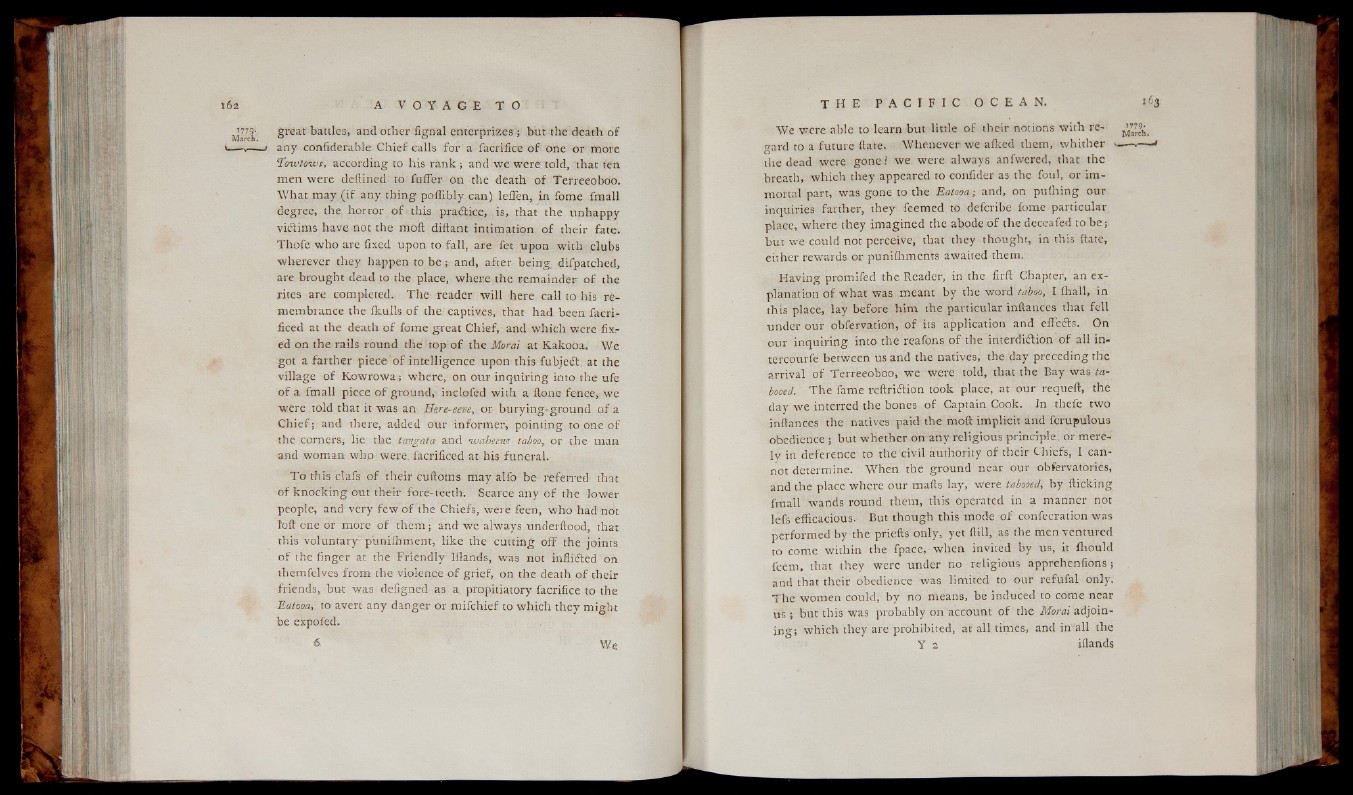
great battles, and other fignal enterprizes-; but the death o f
any confiderable C h ie f calls for a facrifice o f one or more
‘foivtows, according to his r a n k ; and we were told, that ten
men were deftined to fuffer on the death o f Terreeoboo.
What may ( i f any thing poffibly can) leflen, in fome fmall
degree, the horror o f this practice, is, that the unhappy
v iilim s have not the moil diftant intimation, o f their fate.
Thofe who are fixed upon to fall, are fet upon with clubs
wherever they happen to b e ; and, after being, difpatched,
are brought dead to the place, where the remainder q f the
rites are completed. T h e reader w ill here call to his remembrance
the ikulls o f the. captiv.es, that had been facrx-
ficed at the death o f fome great Chief, and which were fixr
ed on the rails round the top o f the Moral a-t Kakooa. We
got a farther piece o f intelligence upon this fu bjeft. at the
v illa g e o f K ow row a; where, on our inquirin g into the ufe
o f a fmall piece o f ground, inclofed with a ftone fence, we
were told that it was an Here.-eeee, or burying-ground o f a
C h ie f; and there, added our informer, pointing to one o f
the corners, lie the tangata and ivaheene taboo, or the man
and woman who were, facrificed at his funeral.
T o this clafs o f their cuiloms may alfo be referred that
o f kn o ck in g out their fore-teeth. Scarce any o f the lower
people, and very few o f the Chiefs, were feen, who had not
Toft one or more o f them; and w e always underftood, that
this voluntary p'unilhment, lik e the cuttin g ofF the joints
o f the finger at the Friendly lilands, was not infliited on
themfelves from the violence o f grief, on the death o f their
friends, but was defigned as a propitiatory facrifice to the
Eatooa, to avert any danger or mifchie f to w hich they might
be expoled.
We were able to learn but little o f their notions with re-
crard to a future Hate. Whenever we ailced them, w h ith e r <— v—■
the dead were gone ? w e were always anfwered, that the
breath, w h ich they appeared to confider as the foul, or im mortal
part, was gone to the Eatooa; and, on pulhin g our
inquiries farther, they feemed to defcribe fome particular
place, where they imagined the abode o f the deceafed to b e ;
but we could not perceive, that they thought, in this ftate,
either rewards or puniihments awaited them.
Having promifed the Reader, in the firll Chapter, an explanation
o f what was meant by the word taboo, I (hall, in
this place, lay before him the particular inftances that fell
under our obfervation, o f its application and effects. On
our inquirin g into the reafons o f the in terdid ion o f all in-
tercourfe between us and the natives, the day preceding the
arrival o f Terreeoboo, we were told, that the Bay was tabooed.
T h e fame reftriflion took place, at our requeft, the
day w e interred the bones o f Captain Cook. In thefe two
inftances the natives paid the moil implicit and fcrupulous
obedience ; but whether on any religious principle, or merely
in deference to the civ il authority o f their Chiefs, I cannot
determine. When the ground near our obfervatories,
and the place where our malls lay, were tabooed, by flicking
fmall wands round them, this operated in a manner not
lefs efficacious. But though this mode o f confecration was
performed by the priefts only, yet ftill, as the men ventured
to come within the fpace, when invited by us, it ffiould
feem, that they were under no religious apprehenfions ;
and that their obedience was limited to our re fufal only.
T h e women could, by no means, be induced to come near
u s ; but this was probably on account o f the Moral adjoinin
g ; w h ich they are prohibited, at all times, and in all the
y 2 illands